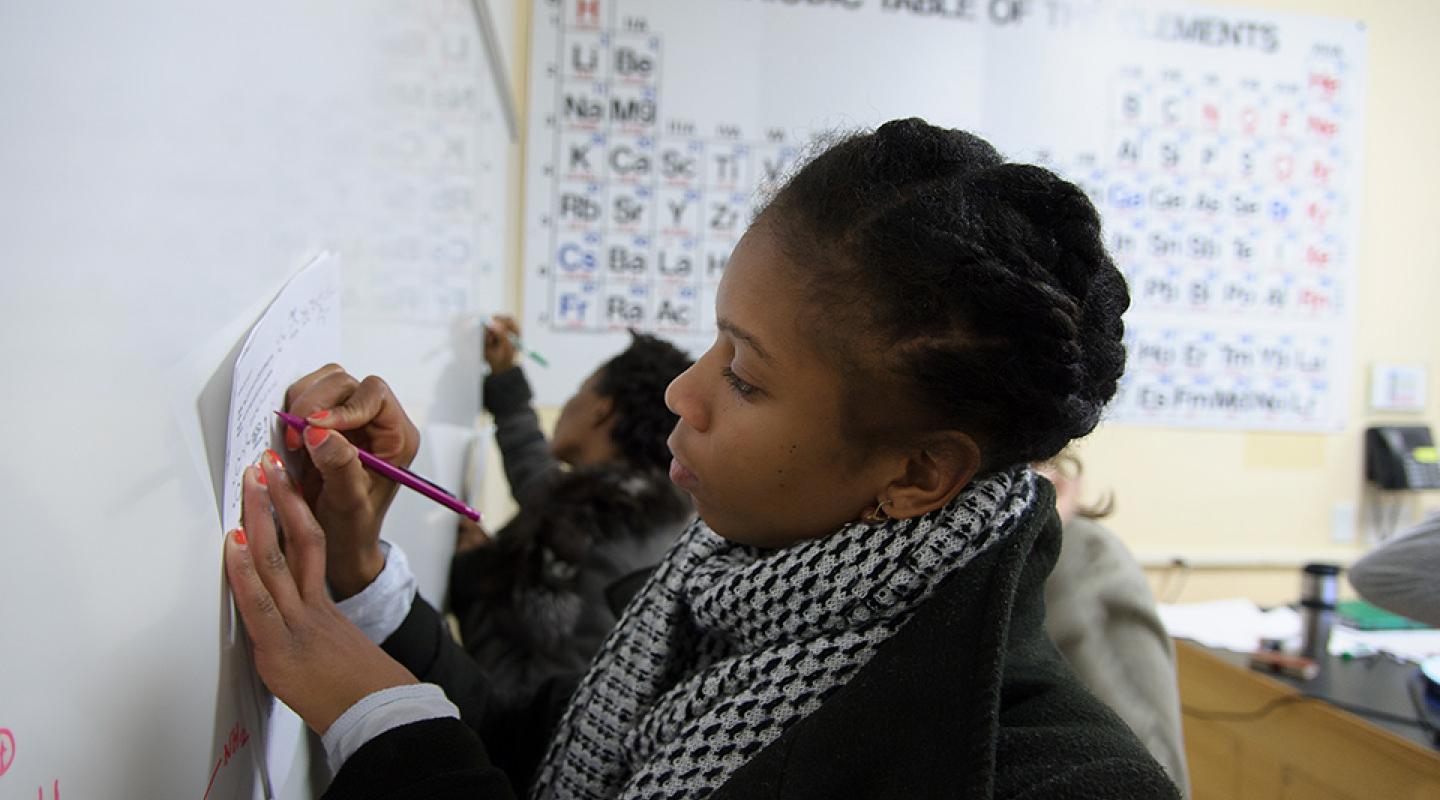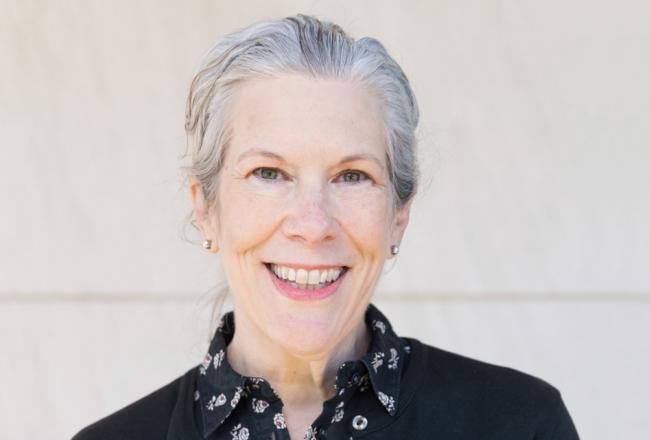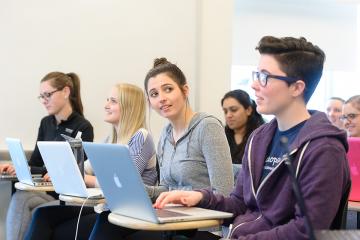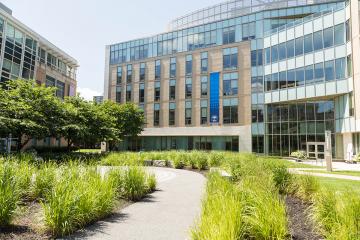How PLAN Works
PLAN provides students with intellectually challenging, meaningful, and project-oriented learning.

The high-impact, interdisciplinary, and holistic approach to higher education provides students with intellectually challenging, meaningful, and experiential learning opportunities.
Campus-based undergraduate students entering Simmons as first-year or transfer students in the Fall of 2024 or after will be expected to meet the current PLAN requirements. All online degree completion students will continue to follow the pre-Fall 2024 PLAN requirements.
Campus-based undergraduate students who matriculated before Fall 2024 can find information here about how to satisfy their PLAN requirements with current PLAN classes.

A Message From Associate Provost Kelly Hager
Read Associate Provost Hager’s February 14, 2024 email to undergraduate students who matriculated prior to Fall 2024 with more detailed guidance about fulfilling their PLAN requirements.
PLAN Requirements
Writing Boston
First year - Fall or Spring Semester, 4 credits
In this writing-intensive first-year course, students will utilize Boston as the theme to hone their college level writing skills. Through engagement with readings about the City, this course develops writing, critical analysis, and information literacy skills.
Simmons 100: Explore
First year - Fall Semester, 2 credits
Explore is designed to provide students with Simmons-specific resources that can be utilized to foster personal and academic success. It will also give students the opportunity to connect with their classmates and reflect on key issues and situations they will face as college students while transitioning to the Simmons community.
Simmons 200: Extend (prerequisite: SIM 100)
Recommended Junior Year, 2 credits
This course will focus on academic, co-curricular, and career planning. In addition to assignments related to resume and interview preparation, internship preparation, and an exploration of graduate school opportunities, the course includes units on the development of competencies in financial literacy, digital literacy, and cybersecurity, as well as an exploration of what it means to be AI-literate in a specific field. SIM 200 will be cohorted by discipline (Humanities, Social Sciences, STEM, Health Professions), so students are advised to take this class after they declare their major.
Key Content Area Courses (KCA)
The key content area courses draw upon three broad areas of knowledge to emphasize a multidisciplinary approach to ways of knowing. They engage phenomena as objects of study through approaches rooted in various disciplines tied to the sciences, the arts, and broad frames of historical and cultural understanding. Students must complete one course from each of the following three areas:
Artistic, Literary, Aesthetic (ALA)
Any semester, 4 credits
Courses in this area focus on phenomena in art and literature as well as ways of knowing or creating original works or aesthetic approaches to these phenomena. This requirement can be met by courses in any of the creative and performing arts as well as any course in the study of literature, art, and music. Courses in other disciplines that provide perspectives of aesthetic, literary, and artistic phenomena as defined above also meet this requirement. For example, a course that studies the digital or computational aspects of artistic creation would meet this requirement.
Global Historical (GH)
Any semester, 4 credits
Global Historical courses provide perspectives on contemporary or historical phenomena as they present themselves socially. They may foreground the perspective of a particular community or person or a specific interpretive frame or historical moment in time, or they may include comparative ways of knowing phenomena across cultures of the globe, within and beyond the US, past and present. Courses in this area offer students the opportunity to study societal topics closely and to appreciate cultural and historical differences as they have manifested for humankind.
Scientific Inquiry (SCI)
Any semester, 4 credits
Courses in this area focus on phenomena in the natural and physical world and on ways of knowing these phenomena, particularly through experimental approaches. This requirement is primarily met by courses in the sciences and psychology; the requirement may also be met by courses in other disciplines providing perspectives on scientific phenomena. All courses meeting this requirement include a "hands on" component providing students the opportunity to understand and appreciate the scientific method.
Key Skills Area (KSA)
While the Key Content Areas focus on knowledge of content, the Key Skills Areas emphasize skills acquired or applied in courses. This category spans skills that are essential for student's success in and beyond academia. It extends to opportunities for students to apply their developing skills and knowledge toward social engagement and change. Students must complete one course from each of the below areas. Note: At least two KSA courses must be taken outside of the student's major.
Diversity, Equity, Inclusion and Justice (DEIJ)
Any semester, 4 credits
Courses with a DEIJ designation provide students opportunities to build skills in the areas of Diversity, Equity, Inclusion, and Justice that can be deployed in organizations, professions, and society. Students in these courses critically analyze social forces and systems and learn how to take some form of action to respond to these forces and systems. A DEIJ course allows explicit knowledge about DEI–Diversity, Equity and Inclusion– through examination of power and privilege as they pertain to gender, race, dis/ability, sexuality, immigration status, socioeconomic status, etc. And they also focus on application of this knowledge toward the creation of change aimed at Justice–not just DEI, but also DEIJ. The ultimate goal of these courses is to–through a combination of analysis and action, or praxis–help students develop agency around understanding and challenging existent forces and systems.
Integrative Learning (IL)
Any semester, 4 credits
The Integrative Learning KSA allows students to study a topic or question that cannot be fully understood without its examination through the lenses of subfields within or between disciplines. This integrative approach to learning aims at helping students develop the habits of mind needed to explore topics and issues that require movement across different perspectives. The KSA is filled by courses that root their approach in any set of disciplines and/or subfields. A central topic or question guides the course, and students learn about content specific to the course topic, but the course is most centrally an opportunity for students to understand what they can and cannot know in the absence of employing multiple perspectives.
Leadership (LDR)
Any semester, 4 credits
The Leadership courses help students expand their ideas of what leadership is and who can lead. These courses support students' ability to envision opportunities to lead, formally or informally, in their careers, their communities, and their lives. Each course focuses on the relationship between leadership and social identities and allows students to develop and demonstrate leadership skills related to both working in teams and public speaking. Students engage with such topics as conflict resolution and advocacy on meaningful issues. Leadership courses typically study successful leaders and/or organizations or specific theories or best practices, in order to help students envision their own ideas of leadership.
Quantitative Literacy (QL)
Any semester, 4 credits
Quantitative Literacy (QL) is a "habit of mind," competency and fosters comfort in working with numerical data. Courses in this area will develop a student's ability to reason and solve quantitative problems from a wide array of authentic contexts and everyday life situations. QL courses will develop the skills necessary to understand and create sophisticated arguments supported by quantitative evidence and to communicate those arguments clearly and in a variety of formats (using words, tables, graphs, mathematical equations, etc., as appropriate).
Writing-Intensive (WI) (prerequisite: Writing Boston)
Any semester after successful completion of Writing Boston, 4 credits
Writing-Intensive courses further develop the competencies introduced to students in the first year writing course, Writing Boston. They encourage more advanced writing proficiency and centralize at least two of the following skills: awareness of audience and context, formulation of arguments and conclusions, evaluation and utilization of researched sources. Writing-Intensive courses also typically include frequent (usually weekly) writing assignments, some informal and ungraded writing, and at least one paper that is read and responded to in draft form by the instructor and then revised by the student. This requirement is filled by courses in multiple departments, and courses are often rooted in the research and methods of the department's particular academic discipline.

PLAN Courses
Our core curriculum, the Simmons PLAN (Purpose Leadership ActioN) will prepare you for 21st-century career success. It will help you find your purpose, practice leadership, and put your knowledge and skills into action.

PLAN Core Requirements
PLAN brings the Simmons principles and values into the present day. Students will complete the Simmons PLAN over the four years of their college experience. View the core requirements on the course catalog site.

Graduation Requirements
View the graduation requirements for our on-the-ground students.
